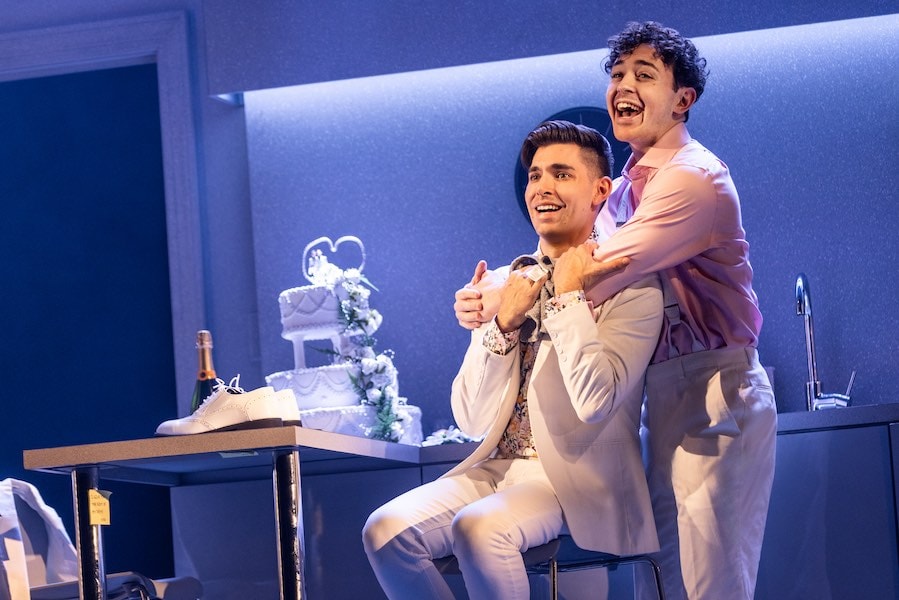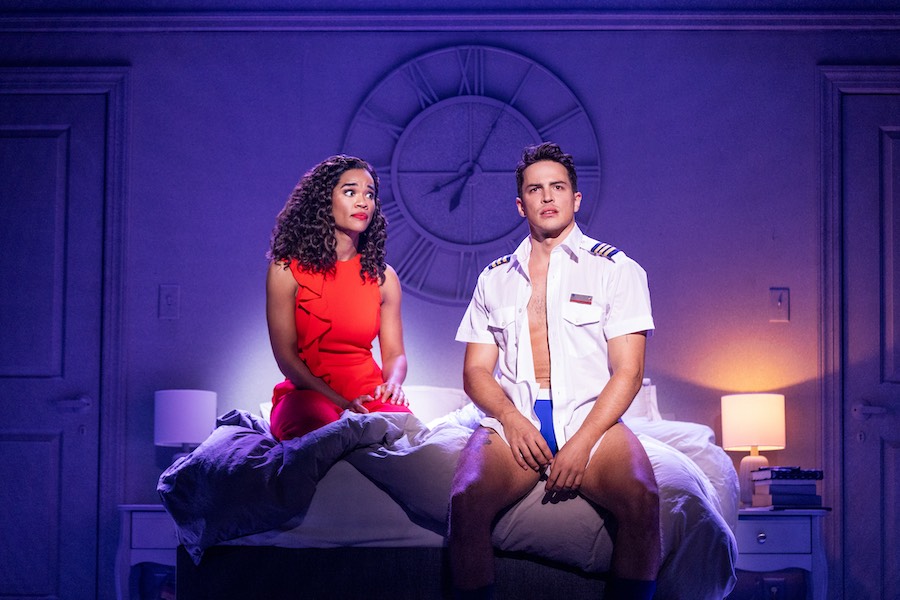There are plenty of musicals that feel dated now, but is there a show that has improved with age?
I saw one example last night at the Kennedy Center Opera House: fresh from its Tony Award–winning run on Broadway, a robust revival of Company, Stephen Sondheim’s sophisticated and acerbic musical that created the dark-comedy-musical genre.

When it premiered in 1970, Company was revolutionary in exploring dating and marriage in the modern age of technology. As Sondheim wrote in his memoir Finishing the Hat, Company is about “the challenge of maintaining relationships in a society becoming increasingly depersonalized.”
In that sense, Company is more relevant than ever. As writer Derek Thompson observed last month in The Atlantic, America’s “social metabolism” has slowed to such a degree that the U.S. Surgeon General has declared an “epidemic of loneliness.”
The musical’s theme — striving for connection but fearing commitment — isn’t the only way in which this Company feels timely and relevant. Bobby, originally a single, male Manhattanite, is reimagined here as Bobbie (an appealing Britney Coleman), a woman who struggles to find real connection in a “city of strangers” hunched over their smartphones.
Far from a mere gender-bending casting stunt, turning Bobby into a woman, which Sondheim personally approved prior to his death in 2021, benefits the production in two ways: as an apt observation of the difficulty educated women currently face in finding suitable men to marry and as an explanation for why Bobbie’s impending 35th birthday looms so ominously in the character’s mind.
An actual ticking biological clock on stage raises the dramatic stakes for Bobbie, who has no shortage of caring friends or potential bedmates but who fears the loss of freedom and individuality that marriage portends.
The idea of marriage isn’t made any more attractive here by the fact that Bobbie’s married friends are endlessly bickering or breaking up, and her engaged friends are fleeing the altar (“Getting Married Today,” a hilariously neurotic Gilbert-and-Sullivan-esque patter song dexterously sung by Matt Rodin).
Here the bride and groom, Amy and Paul, are reimagined as a gay couple, Jamie and Paul, with one post-Obergefell addition to the show’s book: “Just because we can doesn’t mean we should.”

Not all these vignettes are as entertaining as “Getting Married Today,” partially because Coleman is often a passive player in them, voyeuristically spying on other people’s domestic life like a housebound Jimmy Stewart in Rear Window.
Nor do these vignettes fit together with any temporal logic. How can Bobbie be experiencing all these dates and visits to friends’ homes in the span of one day, her 35th birthday? Of course, this is no fault of Coleman’s. Sondheim and book writer George Furth wrote these scenes as little, self-contained one-act plays.
The creative team led by director Marianne Elliott wisely leans into this confusion rather than attempting to cover it up. Several hints exist that these events may only be happening in Bobbie’s head, from Neil Austin’s ethereal, purple-red lighting to the way supporting characters emerge from surreal places (a refrigerator, a cake) to the exaggeratedly large birthday balloons in the shape of the number “35” that tower menacingly above Bobbie like Shelley’s “Mont Blanc.”
The musical works best when Bobbie isn’t relegated to a third wheel and interacts one-on-one with the other characters, most notably in “Barcelona,” Sondheim’s spin on the French aubade, a song about two lovers interrupted by the coming of dawn.

In this scene, Bobbie has a one-night stand with an airheaded airline attendant named Andy (Jacob Dickey), and the two playfully squabble over whether he should report for duty or stay snuggled under the covers with her. When he finally relents, she lets out a plaintive protest of even this tiny trace of commitment: “Oh god!”
Sondheim saves his best material for last in Company, an acid-tongued Act II solo (“The Ladies Who Lunch”) from Bobbie’s older, wealthy, married friend Joanne (Judy McLane, who steals the show in a fur stole).
Delivering a drunken toast, Joanne castigates Bobbie for her role as a perpetual spectator — “always on the outside looking in” — and warns her not to fritter her life away on trivial pursuits like the suburban matrons who “meet themselves at the schools, too busy to know that they’re fools.”
That leads Bobbie to an epiphany that though “two is dreary,” “one is impossible.”
In the show’s famous 11 o’clock number, “Being Alive,” the Kennedy Center’s 11-piece orchestra swells beneath Coleman as she stands at center stage to declare that “alone is alone, not alive.”
As the song goes, “Life is company.”
I’ll drink to that.
Running Time: Approximately two hours and 45 minutes, including one intermission.
Company plays through March 31, 2024, in the Opera House at the Kennedy Center for the Performing Arts, 2700 F St NW, Washington, DC. Purchase tickets ($45–$169) at the box office, online, or by calling (202) 467-4600 or toll-free at (800) 444-1324.
The program for Company is online here.
COVID safety: Masks are optional in all Kennedy Center spaces for visitors and staff. Read more about the Kennedy Center’s mask policy here.





“Not all these vignettes are as entertaining as “Getting Married Today,” partially because Coleman is often a passive player in them, voyeuristically spying on other people’s domestic life like a housebound Jimmy Stewart in Rear Window.”
This is an astute observation — I have had so many interesting discussions this week about how passsive Bobbie is in this production. For me, it made Being Alive feel so divorced from everything else. I hadn’t quite met Bobbie as a character yet as she spends so much of her time being a cipher for the audience to project their own ideas and values onto at the expense of experiencing her as an actual, complete character.
Someone else described it as “Alice in Wonderland” esque – it does have that dreamy quality to it where nothing seems quite real. Still, a vocally interesting production that instigated a lot of conversation! Great review, Geoff.